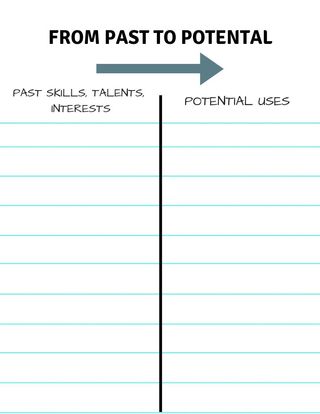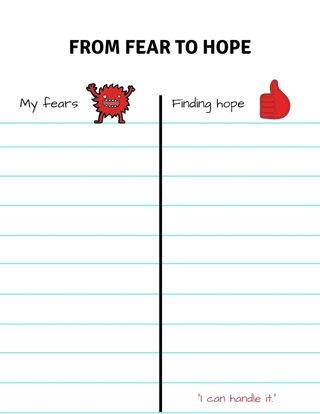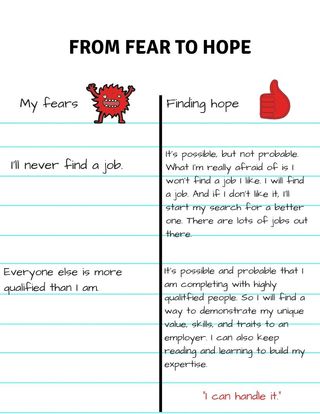Fear
Conquering Fears and Mining Strengths to Get a Better Job
Take a positive focus on your past and calm your job anxiety.
Posted June 30, 2019
I have been posting recently about the value of "simple" lists in helping you clarify career plans, find a better job, or even keep track of the many skills you have developed. In this post, I'd like to further the idea of a "simple" two-column list and use the two columns to show movement and progression. We're going to look at two different lists: one to help you focus on skills and talents from your past that you might be able to use in a new job; and one which focuses on finding ways to fight the fears which might be holding you back.
List #1: How Past Leads to Potential
One of the best predictors of future behavior is past behavior, and we are usually more confident in situations when we can bring part of our past into it. Just think of how much better you feel when you move to a new location and start unpacking your familiar items from the moving boxes. Just seeing something familiar makes the new situation a little less strange. Our interior experiences aren’t all that different from tangible items. The opportunity to use old skills and reignite old interests can make the transition to a new job much easier.
In this list, you’re going to use the left column to identify various activities, skills, or interests from your past (recent or distant). Just brainstorm, thinking about former jobs you have held, and the activities, skills, and talents you have even if you haven’t done them in a while. Go as far back as you want–even to elementary school, if you wish.

Now, as you look over your list, what skills, talents, or interests would like to apply to a future role you might have? How could you repackage some of those activities to fit the new job you’re seeking or starting? Can you see a broader picture of your skills, so you don’t limit them to the activity in the past? How might early experience be a bonus for a future position?
At age 42, Julia is ready to return to the workplace after raising three children. But she’s not sure what career she could fit into at this point. It’s been about twenty years since she graduated from college and she has done some volunteer work, but nothing that she would consider as a possible career. She starts to fill out the left column with skills and interests, going back as far as high school. She recalls that in her 20s, she worked as an intern in a nonprofit organization and helped to write grants. She didn’t create the final copy, but she did conduct all the research and drafted the basic outline and sections of the grant. She remembers how much she enjoyed that internship and she thinks she might like to give grant-writing another try. She knows she needs to learn more, though, so she starts with a trip to her local library to get current books on grant-writing. She’s pleasantly surprised to see that a lot of the basic elements are the same, so she starts working on a sample “grant” she could show to a potential employer as an example of her skills. She finds her confidence returning as she builds her list of skills.
List #2: Transforming Fear to Hope
Fear is one of the most crippling emotions, and it can hold us back from experiences including job searching. In her excellent book, Feel the Fear and Do it Anyway, Susan Jeffers says there’s really only one fear: the fear that if something happens, you won’t be able to handle it.
One quick way to calm your fears is to consider the probability or likelihood of what you fear coming true. We can always say, “anything is possible” and it’s true—that thing you fear might very well be possible. But is it probable? Consider estimating the probability of something occurring versus the possibility. Think of a common source of anxiety for people: flying. Is it possible that a plane will crash? Absolutely. We know this is true because it has happened. But the overall estimate of the likelihood of a plane crash in the United States is incredibly small, as in multi-millions to one. So while it is a possibility, the probability is very low.

This simple diagram can help you identify your key fears about your job search and come up with coping statements that will help you overcome them. This is another example of the power of writing things down; so often we keep our fears in our heads and let them just drift there. By naming them, facing them, and coming up with coping statements we will be able to fight them more easily.
This is a great chart to keep handy because we tend to “recycle” our fears. Fears don’t just go away; they return to haunt sometimes at the worst times, like 3:00 am. But since we know they tend to do that, referring back to this list of hopeful responses to your fears can help calm your anxious thoughts and you can also see that many of these thoughts aren’t new—and many have never come true.
Life coach Martha Beck works with a lot of professional, accomplished women, many of whom are quite wealthy. And yet she finds that most of them harbor a secret fear that they will end up as a “bag lady.” From an outsider’s perspective, this may seem ridiculous (again, think possibility versus probability), but it’s a secret horror that they live with each day that takes away their enjoyment of the present. When you find yourself focusing on something that is possible but not probable and is taking away your enjoyment or increasing your anxiety, practice telling yourself, “I can handle it.”

Here’s how one job-seeker filled out her Transforming Fear to Hope list.
You can see how the statements she wrote could help her cope better with her fears when they arise. She acknowledged that her fears had a "possible" element of truth, but also that they were "probably" not likely to happen. She also used the right column to think through the general fear and make it more specific. For instance, she took her fear of "never finding a job" and realized she was more fearful of finding a job she didn't like or want. Once she realized that, she could relax and focus on what she wanted.
Give these two lists a try and see if they help you with aspects of your job search.
©2019, Katharine S. Brooks. All rights reserved.




